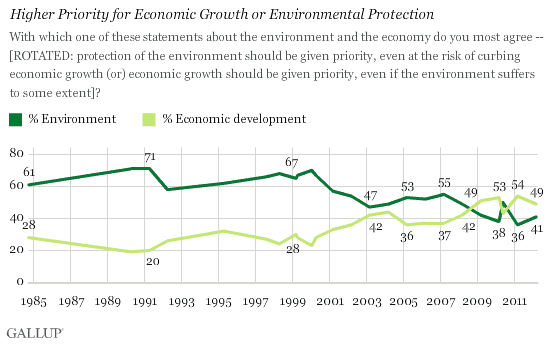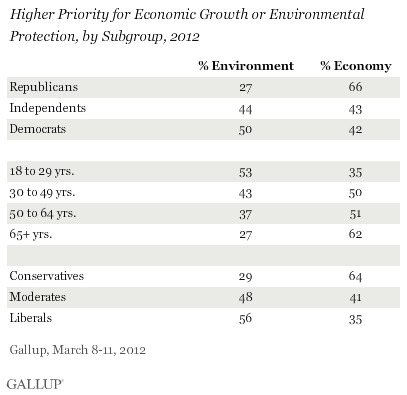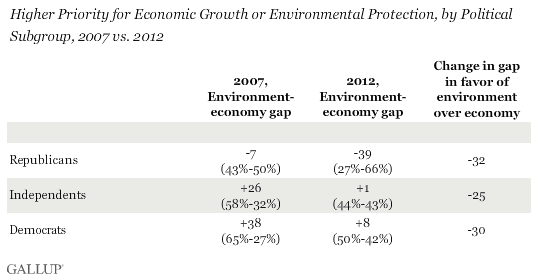PRINCETON, NJ -- Americans continue to prioritize economic growth over environmental protection, by a 49% to 41% margin, as they have since 2009. This eight-percentage point gap in favor of economic growth is smaller than last year's record 18-point gap.

For most of the last three decades, Americans have prioritized "the environment, even at the risk of curbing economic growth" over "economic growth … even if the environment suffers to some extent." Prior to 2001, about two-thirds of Americans routinely favored protecting the environment. Even as the recession and financial crisis were getting underway in early 2008, more Americans favored the environment than economic growth, by a seven-point margin.
This trend changed as the recession deepened in 2009, with economic growth taking priority over the environment and continuing to do so through this year. Gallup found half of Americans choosing the environment after the BP oil spill in the Gulf of Mexico in May 2010, but the data suggest that this major environmental event had only a temporary effect on the trend.
The modest improvement in the U.S. economy in early 2012 may have led some Americans to be somewhat less concerned about unemployment and economic growth, perhaps explaining this year's slight shift in favor of the environment.
Gallup finds a similar trend this year in Americans' preferences for the trade-off between environmental protection and energy production.
Young People, Democrats, and Liberals Prioritize Environment
Most subgroups of Americans favor economic growth over the environment. In fact, at least half of Americans 30 or older, conservatives, and Republicans prioritize economic growth. However, half or more of younger people aged 18 to 29, Democrats, and liberals instead prioritize the environment, as they have in past years.
It is not surprising that Republicans and Democrats have different priorities. But the fact that independents are evenly split on this issue is a change from a year ago, when half favored economic growth.

Americans' Priorities Have Shifted Dramatically Since 2007
Prior to the recession and financial crisis, in 2007, most Americans across subgroups prioritized the environment (55%) over economic growth (37%). Today's eight-point margin in favor of economic growth reflects a 26-point shift toward growth compared with 2007.
Similar shifts have taken place across political parties. Republicans' views have shifted 32 points and Democrats' views have shifted 30 points toward prioritizing economic growth since 2007, while independents' views have shifted 25 points.

Trade-off percentages and shifts in those percentages for all subgroups are found on page 2.
Implications
In an economic context, the environment is a public good that to a certain extent is paid for by limits placed on businesses and, therefore, economic growth, by way of government regulations. During good economic times, when the economy is growing at a good pace and unemployment is close to its historical norms, Gallup's annual environmental survey data have found Americans tending to favor the environment over economic growth. Like many a public good, the cost seems more affordable when the overall economy is doing well.
However, the U.S. has not experienced good economic times since 2007, prior to the recession and financial crisis. Not surprisingly, Gallup data also suggest that Americans' views of the trade-off between the environment and economic growth have changed over the past several years. This has been the case across political parties and demographic subgroups. The relative cost of the public good of the environment has increased in the minds of many Americans and, thus, their support for it at the expense of the economy has diminished.
Slow economic growth, surging gas prices, and political battles over energy and environmental policy could become a big part of this year's presidential election campaign. The long-term trend in Americans' views of the trade-offs between the environment and economic growth suggest that this is more likely to become a major issue in the presidential race if the U.S. economy continues to struggle than if the economy picks up significant positive momentum.
Survey Methods
Results for this Gallup poll are based on telephone interviews conducted March 8-11, 2012, with a random sample of 1,024 adults, aged 18 and older, living in all 50 U.S. states and the District of Columbia.
For results based on the total sample of national adults, the maximum margins of sampling error are ±4 percentage points.
Interviews are conducted with respondents on landline telephones and cellular phones, with interviews conducted in Spanish for respondents who are primarily Spanish-speaking. Each sample includes a minimum quota of 400 cell phone respondents and 600 landline respondents per 1,000 national adults, with additional minimum quotas among landline respondents by region. Landline telephone numbers are chosen at random among listed telephone numbers. Cell phone numbers are selected using random-digit-dial methods. Landline respondents are chosen at random within each household on the basis of which member had the most recent birthday.
Samples are weighted by gender, age, race, Hispanic ethnicity, education, region, adults in the household, and phone status (cell phone only/landline only/both, cell phone mostly, and having an unlisted landline number). Demographic weighting targets are based on the March 2011 Current Population Survey figures for the aged 18 and older non-institutionalized population living in U.S. telephone households. All reported margins of sampling error include the computed design effects for weighting and sample design.
In addition to sampling error, question wording and practical difficulties in conducting surveys can introduce error or bias into the findings of public opinion polls.
For more details on Gallup's polling methodology, visit www.gallup.com.

